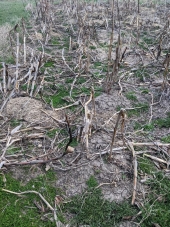Worm castings and biochar will be fine.
From;
too much of a good thing
Unlike other plant nutrients,
phosphorus does not leach in the soil.
This means that too much phosphorus in the soil can build up over the course of several growing seasons.
Excessive phosphorus can occur for several reasons.
Most commonly this issue is caused by repeated use of manures or non-organic fertilizers.
While a surplus of any nutrient may not seem like an issue, lowering phosphorus levels is actually quite important.
Too much phosphorus in the soil can be detrimental to the overall health of the plants.
High phosphorus can cause deficiencies in zinc and iron in the soil, as they quickly become unavailable for use by the plants.
Unfortunately, there are no ways to actively reduce excessive phosphorus in garden soil.
In working to moderate phosphorus levels in the garden, it will be imperative that growers avoid the use of fertilizers that contain phosphorus for several growing seasons .
In order to remove excess
nitrogen in soil, you need to bind the nitrogen that is in the soil to something else.
Fortunately, as a gardener, you probably grow many things that bind nitrogen
— in other words, plants. Any plant will use some nitrogen in the soil, but plants like squash, cabbage, broccoli and corn
use up large amounts of nitrogen while growing.
By growing these plants where there is too much nitrogen in soil, the plants will use up the excess nitrogen.
Be aware though, that while they will grow there, plants may look sickly and will not produce many fruits or flowers.
Keep in mind that you are not growing these plants for food purposes, but rather as sponges that will help lower soil nitrogen content.
Many people
use mulch in their garden
When you have too much nitrogen in the soil, add mulch that uses lots of Nitrogen, IE Cheap, dyed mulch is generally made from scrap soft woods and these will use higher amounts of nitrogen in the soil as they break down. For this same reason, sawdust can also be used as a mulch

 3
3




 4
4




 1
1





















 1
1











